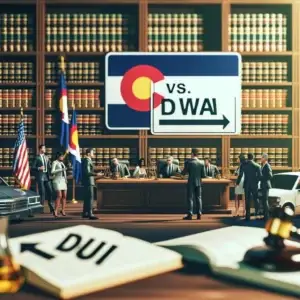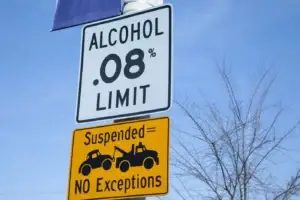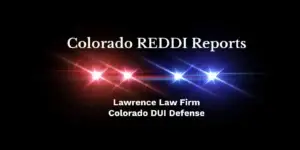Most people charged with driving under the influence will face a second case. The second case deals with the person’s driving privileges. People commonly refer to it as the DMV hearing or administrative hearing.
The second case can often be the most important. An average person will not be able to function without a valid driver’s license. A DMV hearing can have serious consequences.
Understanding the process will help to minimize the consequences. It will also help you to prepare for the hearing and potential outcomes. A skilled DUI Defense Attorney will be able to guide you through the process and explain every step after being charged with driving under the influence.
What Law Provides for the DMV Hearing?
The Colorado Express Consent Statute permits police officers to request a chemical test. The law enforcement officer must have probable cause to believe a defendant is driving under the influence. The officer will then have to request the defendant perform a chemical test of the person’s blood alcohol content. The test can be a breathalyzer or a blood test.
The back end of Colorado Express Consent Statute requires the Department of Revenue to revoke a defendant’s driving privileges if their BAC is above .08 within two hours of driving. The defendant can challenge this revocation. You must make a request for a hearing within 7 days of the initial revocation.
Breath tests will result in immediate revocations. Blood tests will not be immediate because it takes time to receive the results. They will hold the hearing within 60 days of receiving the request.
What are the Rules of a DUI DMV Hearing in Colorado?
The express consent hearing after a DUI focuses on the defendant’s driving privileges. The operable word in that sentence is privileges. It isn’t a right and taking it is significantly easier than taking your money or putting you in jail.
The burden of proof is a preponderance of the evidence. This is a civil standard, and it is much lower than a criminal standard. The state only needs to prove their case by a more likely than not standard.
The case is also heard by a hearing officer. A defendant is not entitled to a jury. Evidentiary rules are also relaxed. Hearsay is not admissible in a criminal trial, but it would be admissible if it is found to be reliable.
A defendant is entitled to a defense attorney. They are permitted to cross-examine any witness called to testify against them. The Colorado Express Consent statute permits a defendant to appeal any express consent order.
Finally, a defendant has a right to testify or not. A defendant who chooses to testify must remember that their statements can be used against them. Typically, the court holds a DMV hearing before resolving the criminal driving under the influence case.
What Does the State Have to Prove at the DMV after a DUI?
While the cases are separate, the arguments used in the DUI defense and express consent hearing will be similar. The state must establish a chain link of events. The chain is important. If the state cannot prove the first link, it does not matter if they can establish the remaining.
The state must first establish that law enforcement had probable cause to contact a driver. This can happen in a variety of ways. The most common police contact is at a traffic stop. Law enforcement must have probable cause to believe a driver broke one or more traffic laws to initiate a traffic stop.
Police can also contact drivers after a car crash to investigate or for welfare checks. A Colorado DUI attorney will be able to examine the records to determine if there is sufficient probable cause for the initial contact.
Second, law enforcement must have probable cause to believe a defendant may be under the influence. The standard is not that the defendant is drunk. Rather, a cop must establish they had a reason to believe the defendant may be intoxicated.
This will come in the form of indicia of alcohol consumption, statements of alcohol consumption, and observations of the defendant. A defendant’s performance of standard field sobriety tests will also be used at this stage.
Third, police must establish that a defendant was advised of express consent. After a DUI arrest, police will typically read to a defendant from a department issued card. Establishing this link at the DMV hearing require a police officer to simply state they told the defendant of express consent.
Defendants must give a blood or breath sample within two hours of being in control of their vehicle. If the defendant meets all these conditions, their driving privileges will be revoked. The period of revocation will depend on whether a defendant submitted or refusing to submit and number of prior revocations. Consult a DUI Defense lawyer to understand the full impact of a revocation.
What Happens After a DUI Revocation in Colorado?
The revocation for a first DUI is 9-months if a test was provided. A first refusal will result in a 1-year revocation. Defendants will be permitted to apply for early reinstatement of their driving privileges. In some cases, it could be possible to wait out the revocation period and get your license back without condition.
In other cases, a defendant will be required to get an interlock device after the revocation period. It would be beneficial to get a license back as soon as possible. What happens after a DUI revocation in Colorado is a complicated question. A DUI Defense attorney can provide guidance in how to best proceed.
Always Speak with a DUI Defense Attorney
Driving is essential for most people in Colorado. The impact of a DUI to a person’s driving privileges can be a significant hardship. It is important to know what you are dealing with to understand how best to prepare.
This is why it is crucial to speak with a DUI Defense lawyer to understand how to proceed. Most DUI lawyers will offer free consultations.
The Lawrence Law Firm is a DUI Defense firm located in Aurora. We have over 10+ years of experience representing DUI defendants. Do not hesitate to contact our firm if you have questions concerning a DMV Hearing after a DUI.






